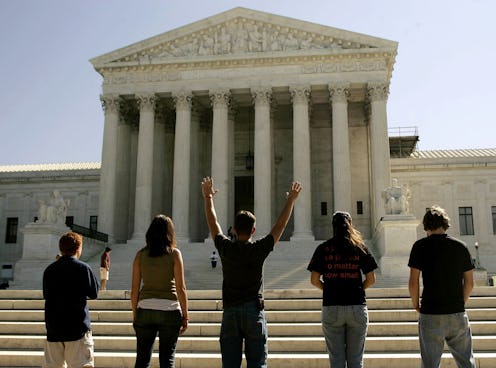News
Supreme Court Refuses To Hear Anti-Abortion Plea
Depressingly, in the last three years, more anti-abortion legislation has been passed than in the previous decade. But don't give up on the courts just yet: On Monday, the Supreme Court flat-out refused to hear a challenge from Arizona petitioners who are keen to resurrect a ban on abortion after 20 weeks. In fact, so unpersuaded was the Supreme Court by the Arizona petitioners, it hasn't even given a reason for declining the hearing, contrary to custom.
So where did this all start? In April 2012, Arizona governor Janice K. Brewer signed into law a ban on abortions after 20 weeks, which jumped on the back of The Pain Capable Unborn Child Protection Act passed by the House of Representatives. The ban remained legal for almost a year, in spite of the evidence that substantiated the Pain Capable Unborn Child Protected Act being very shaky: the scientific evidence cited in regard to the pain capability of fetuses was contested by the medical community.
That wasn't the only problem with the Arizona ban. The state law completely bypassed the seminal 1973 Roe v. Wade ruling, and measured the 20-week cut-off point from the date of a woman's last period, rather than from the date of conception. In other words, Arizona's abortion ban was effectively set at 18 weeks, rather than 20. And it allowed for exceptions only in event that the woman risked immediate death by continuing with the pregnancy, or a "substantial and irreversible impairment of a major bodily function."
But in May 2013, the law was deemed unconstitutional by the U.S. Ninth Circuit Court of Appeals. And while that didn't stop other states like Texas, Ohio, and Oklahoma from attempting similar restrictions — nor did it dissuade Arizona's pro-life lobby — the ruling was one that the Supreme Court apparently has no plans on lifting.
And the Supreme Court could make another landmark abortion decision shortly. On Wednesday, the Supreme Court will hear the case of McCullen v Coakley, brought by protestor Eleanor McCullen, who stands outside the Boston Planned Parenthood clinic on Tuesdays and Wednesdays to try and dissuade women from having abortions. McCullen claims that current state law, which allows for a 35-foot buffer zone outside clinics where she cannot protest, tramples on her constitutional free-speech rights.
Luckily, the odds are not in McCullen's favor. This Massachusetts law on the buffer zone has already withstood several legal challenges, including one last year. And in 2000, a similar law in Colorado, which prohibits anyone from protesting, counseling, or demonstrating within eight feet of a person entering a medical facility, was also upheld.
So it seems 2014 could be the year the Supreme Court puts its foot down when it comes to anti-abortion legislation. Let's hope so.
Image: Getty Images
